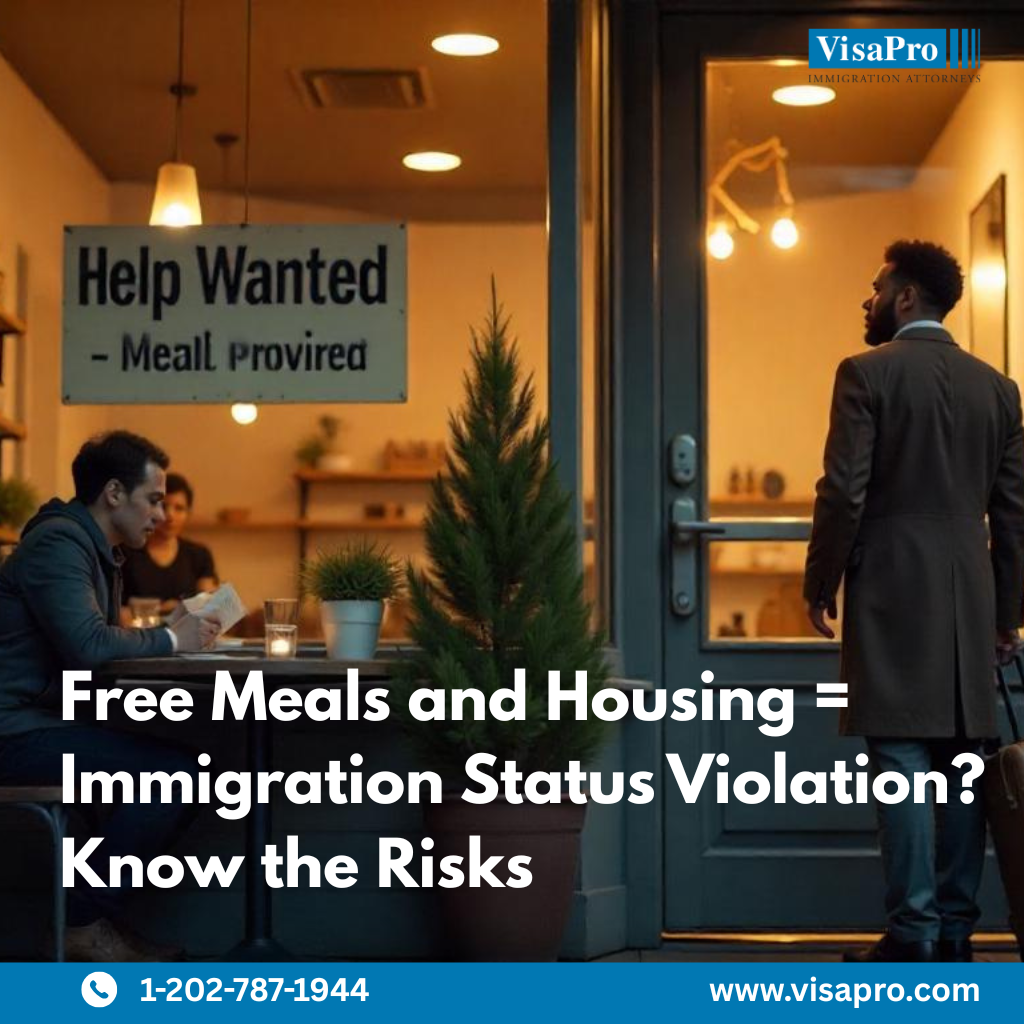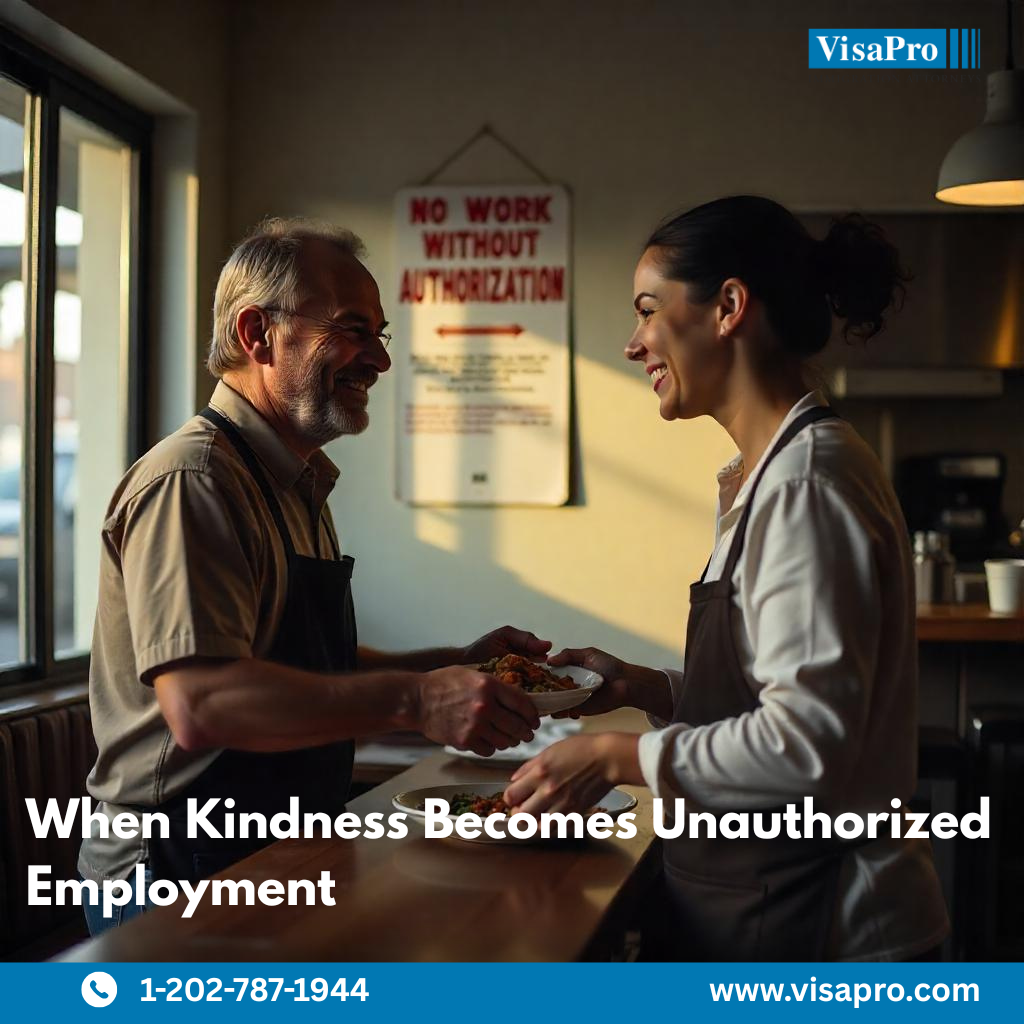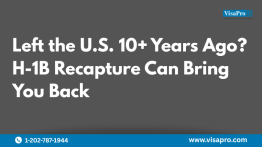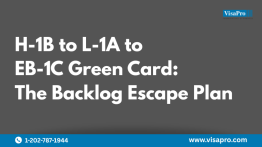Quick Summary:
If you’re offering noncitizen help in your business and compensating them, even informally, with free meals, lodging or even just “experience”, you could be triggering serious immigration violations. This article unpacks the complex legal boundaries between helping, volunteering, and unauthorized employment, and helps you protect both yourself and your business from penalties.
Understanding When “Helping Out” Becomes A Status Violation
Even without wages, providing free meals, housing, or any other benefits can lead to findings of unauthorized employment under U.S. immigration law.
U.S. immigration authorities define unauthorized employment broadly. Even if a person is not being paid, if they are receiving anything of value, like food, housing, transportation, or experience, in exchange for services, it will likely be considered employment. This could trigger a status violation for the noncitizen and penalties for the employer if the individual is not authorized to work in the US.
For example:
- A Canadian friend who occasionally helps at your store and receives lunch in return may be considered to have worked.
- A Japanese visitor who helped clean a restaurant in exchange for free meals was found to have committed unauthorized employment.
- A Buddhist nun receiving room and board while helping a temple was deemed to be in violation of her visa status.
Immigration authorities apply strict standards. Any benefit in exchange for services, even if informal or well-intentioned, may lead to an immigration violation.
What Is “Unauthorized Employment” In U.S. Immigration Law?
Unauthorized employment is any work performed by a noncitizen in the U.S. without appropriate employment authorization, including unpaid work performed in exchange for benefits.
According to USCIS, unauthorized employment includes any services provided to a U.S. entity without proper work authorization. It’s not just about receiving wages. If there is an exchange, services for something of value, it’s likely unauthorized employment.
Common examples include:
- F-1 students volunteering at a business owned by a family friend.
- J-1 visa holders helping in a store for experience while getting housing covered.
- H-1B spouses helping at their spouse’s company while “not on payroll.”
This is why immigration law experts warn against even occasional or informal help. If there’s a clear pattern of benefit-for-service, even without salary, it can count as unauthorized employment.
Can You Work For Free Or Volunteer Without Violating Immigration Law?
Generally, only bona fide volunteer work, usually for nonprofits or religious institutions, is allowed without violating immigration status. Volunteering at a for-profit business, even without pay, is typically not allowed.
USCIS distinguishes between volunteering and unauthorized employment based on:
- The nature of the organization (nonprofit vs. commercial business)
- The intent (community service vs. business or personal benefit)
- Whether similar positions normally require payment
Acceptable:
- Volunteering at a food bank or animal shelter
- Helping with community events organized by a nonprofit
Unacceptable:
- “Volunteering” at a retail store, salon, or restaurant
- Helping with customer service, stocking, cleaning, or business operations, even occasionally
The law is clear: if your help benefits a for-profit business or yourself, especially if others are paid for similar work, it may constitute unauthorized employment.

Penalties For Unauthorized Employment And Hiring Violations
Noncitizens may face serious immigration violations, including status loss. Employers may be fined for hiring unauthorized workers, even unknowingly.
Consequences for the individual:
- F-1, J-1, or H-1B status violation
- Denial of future visas or adjustment of status
- Triggering the 3- or 10-year bar on reentry to the U.S. if there is a finding of unlawful presence
Consequences for employers:
- Immigration fines for hiring unauthorized workers
- Civil and criminal liability for repeat violations
- Ineligibility for certain federal contracts
Even informal, unpaid arrangements can create legal exposure. Employers should never allow anyone to “help out” unless they are properly authorized to work.
Can Free Meals Or Lodging Count As “Compensation”?
Yes. USCIS and immigration courts have ruled that free meals, lodging, or other benefits can constitute compensation and therefore unauthorized employment.
In immigration law, compensation isn’t limited to wages. Anything of value- room, board, gift cards, rides, store credit, or valuable “experience” can be considered a benefit in exchange for services.
Real case examples:
- A Japanese student receiving lunch during shifts was found guilty of unauthorized employment.
- A nun helping with temple duties and getting free housing was ruled in violation of status.
If you’re providing food or housing in exchange for help, even out of kindness, you may unintentionally create an employment relationship in the eyes of the law.
Exploring Legal Paths: E-2, L-1, J-1, and Other Work Visas
If a foreign national wishes to assist in a U.S. business, they may be eligible for either an E-2 Treaty Investor Visa or an L-1 Intracompany Transferee Visa, depending on their background and business structure. These options allow legal work authorization and help avoid violations tied to informal help or in-kind compensation.
E-2 Treaty Investor Visa:
The E-2 visa is available to citizens of certain treaty countries, including Canada, Japan, and many European nations. It allows individuals to:
- Invest a “substantial” amount in a U.S. business (typically $100K or more, depending on the business type)
- Own at least 50% of the business
- Enter the U.S. to direct and develop the enterprise
E-2 visa holders can legally work in their business without requiring separate work authorization.
Important Notes:
- The investment must not be marginal; it should support more than just the investor
- Passive investments (e.g., real estate or stocks) without active involvement do not qualify
- The visa must be approved before the individual begins helping
- In certain low-cost business models, a $50,000 investment may suffice, but higher amounts are generally recommended
L-1 Intracompany Transferee Visa:
The L-1 visa is suitable for business owners or executives of companies outside the U.S. who wish to expand into the U.S. by opening a new office or transferring key personnel.
To qualify for the L-1:
- The foreign company and the U.S. business must have a qualifying relationship (parent, subsidiary, branch, or affiliate)
- The transferee must have worked for the foreign company in a managerial, executive, or specialized knowledge role for at least 1 year in the past 3 years
- The U.S. company must be or will be doing business and capable of supporting the managerial or executive role
L-1 visa holders are allowed to work full-time for the U.S. entity legally, and this option is often ideal for business expansion without needing to invest personal funds as required under the E-2.
Additional L-1 Advantages:
- No minimum investment requirement
- Available to nationals of any country (no treaty requirement)
- May lead to a Green Card through the EB-1C immigrant visa for multinational managers and executives
Other Options To Consider:
Depending on the individual’s goals and background, other visa options like J-1 (Exchange Visitor), H-3 (Trainee), or H-1B (Specialty Occupation) may also provide a legal path to participate in a U.S. business or training program. The right visa will depend on the specific role, background, and business context. We encourage you to schedule a Free Visa Assessment with our attorneys to determine the best and safest option for your situation.
Before allowing any form of business assistance or contribution, it’s critical to pursue the appropriate visa option. All of these routes provide legitimate, structured paths to engage in U.S. business operations without triggering immigration violations.
How To Protect Yourself From Immigration Violations
Always verify work authorization before allowing any help at your business. Don’t offer free benefits in exchange for services. Consult an immigration attorney to explore legal pathways.
Checklist for small business owners:
- Don’t allow informal help from friends or family who don’t have clear authorization to work for any employer
- Avoid offering meals, lodging, or rides in exchange for help
- Ensure all workers have proper authorization (I-9 compliance)
- Explore legal options like the L-1, E-2 visa for business involvement
If you’re unsure about a situation, contact an immigration attorney before proceeding. Unintentional violations can have severe, long-lasting consequences for both the business owner and the foreign national.
Frequently Asked Questions (FAQ)
1.Do free meals count as unauthorized employment compensation?
Yes. U.S. immigration authorities have ruled that free meals provided in exchange for help can count as compensation, which may constitute unauthorized employment.
2.What is the penalty for unauthorized employment?
Foreign nationals may face immigration violations and/or visa denials. Employers can face immigration fines and penalties for hiring unauthorized workers, even informally.
3.Is volunteering at a family business a status violation for F-1 students?
Yes, unless specifically authorized under CPT or OPT. Even unpaid help at a family business can be considered unauthorized employment for F-1 students.
4.Can free room or housing cause an immigration violation?
Yes. Free lodging provided in return for services, such as cleaning, helping with customers, or business tasks, can be seen as compensation.
5.What are the penalties for hiring undocumented workers or those without work authorization?
Employers may face fines up to $16,000 per unauthorized worker and risk criminal liability for repeated offenses.
Worried you may be in violation of immigration rules? Let VisaPro help.
Contact our expert attorneys to explore legal options like the J-1, H-3, E-2 or L-1 visa or to ensure your business practices comply with immigration law. Schedule your Free Visa Assessment today.
What VisaPro Customers Are Saying
The US [B-1] Visa has always been a tough ride, and being denied a few times it makes it even worse. But thanks to VisaPro and their meticulous processing I was granted a Visa. I would like to thank you and all the people involved in making this a success. I would like to recommend VisaPro to all those who seek peace of mind and hassle free Visa processing.”




 Manas Bhat, Director Operations, First Houston Mortgage India
Manas Bhat, Director Operations, First Houston Mortgage India



